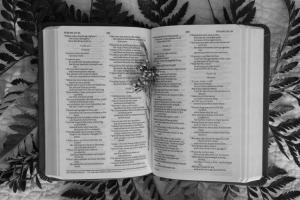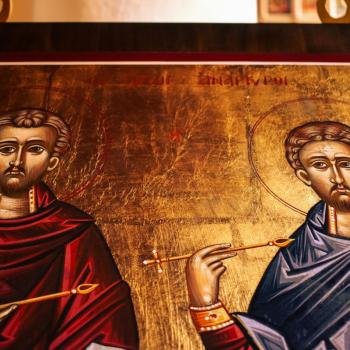The Politics of Praise
Luke 2:21 – 40

Photo by MART PRODUCTION
I have an unusual subject: The politics of praise. This biblical politics has been working for centuries in plenty of Christian churches.
In the great catechism of Reformed faith, the Westminster Catechism, the first question is, “What is the chief concern of human persons?” The answer is, “The chief human concern is to glorify God and enjoy God forever.” (Walter Brueggemann, The Psalms and the Life of Faith, Kindle Locations 1295-1296).
And who in the Christian world pays more attention to praise than the Episcopalians? The Book of Common Prayer is the Anglican book of praise. Of course, “praise” is an Anglican theme, for who has done it better, or longer? (Walter Brueggemann, The Psalms and the Life of Faith, Kindle Locations 1294-1295).
Will D. Campbell wrote a book about Episcopal bishop Duncan Gray. Campbell said that he was struck by the number of times he found the words “joy” and “joyous” in the Book of Common Prayer. They were the words people often used to describe Bishop Gray: “He is the most joyous person I have ever met,” his wife said. Campbell concluded that a good man would be a man of unceasing joy in the biblical and Book of Common Prayer understanding. Not joy as happy-go-lucky for he is capable of deep sadness. Over the years, through trials and tribulations, good times and bad, victories and defeats; joyous.
And don’t leave out the Benedictine’s. They are a praise-heavy bunch of Christians. The Methodists with their hymns and Book of Worship, the Lutherans, the UCC, and all over the world outside our limiting historical traditions, there are Christians praising God and doing it well.
The Jews Taught Us to Praise
Never forget the Jews taught us to praise God. Abraham Heschel said, “The secret of spiritual living is the power to praise. Praise is the harvest of love. Praise precedes faith. First we sing, then we believe. The fundamental issue is not faith but sensitivity and praise, being read for faith…. The man of our time is losing the power of celebration…. Celebration is an act of expressing respect or reverence for that which one needs or honors” (Abraham Heschel, Who Is Man, 116-17).
Praise, serious, powerful praise explodes in our gospel reading:
There’s Simeon’s song of praise: “Master, now you are dismissing your servant in peace,
according to your word;
for my eyes have seen your salvation,
which you have prepared in the presence of all peoples,
a light for revelation to the Gentiles
and for glory to your people Israel.”
Then Simeon blessed them and said to his mother Mary, ‘This child is destined for the falling and the rising of many in Israel, and to be a sign that will be opposed so that the inner thoughts of many will be revealed—and a sword will pierce your own soul too.”
Then Anna joins the praise of Simeon and extends it beyond the temple: “At that moment she came, and began to praise God and to speak about the child to all who were looking for the redemption of Jerusalem.”
The churches need a focus on praise, participatory praise. Not merely watching or enjoying but participating in praise. The praise in the psalms is often tempered by distress, danger, turmoil, suffering, and sacrifice. This is the praise that is filled with every sort of power.
I make the audacious claim that biblical praise, if taken seriously, if practiced diligently in the churches, “a new public world will be enacted.”
The Psalms: Textbook of Praise

Photo by Tara Winstead
The primary textbook of praise – The Psalms! The politics of praise flows from the psalter. Andre Chouraqui, in his Introduction to the Psalms says, “What a savor these words have! For thus have they passed through all the nights, come through all the wars, moved by the mad hope of one day seeing, when night is at an end and darkness is no more, a child rise upon the holy hills to sing before the Ark. They had carried this book with them when they went into exile; they experienced each of its verses in their own flesh, in their own blood. They lived it even as they read it. They were bound to this book.”
No doubt the Psalms have plenty of laments and complaints, but these are honest expressions of how God’s people sometimes feel and how we experience tough times. On the other side of lament and complaint, there is praise. In the conclusion of many psalms, praise shows up to wipe out lament, rout complaining, and put out to pasture dissension, anger, resentment, and revenge.
Good Morning, America. I have a biblical flash for you. Praise of God is the conclusion of complaint and lament. Claus Westermann has shown that praise is characteristically the conclusion of complaint, lament. We need to stop complaining and start praising.
The Psalm for today, Psalm 148, is an astonishing hymn of praise, with all of God’s creatures joining together in one song, drawn together by their sheer nearness to God.
Here David claims all of creation for praise. In an age when humans are clinging to fossil fuels and placing all humanity on the endangered species list, we could use some praise and respect for creation. The whole world is engaged in celebrative acknowledgment that God gives life.
Reframing From Lament to Praise
One move here can transform Christians and churches. One move – shift from politics of shame, division, anger, resentment to praise of Almighty God. To use a term from the discipline of rhetoric: Reframing our faith as praise.
George Lakoff, in Don’t Think of an Elephant: Know Your Values and Frame the Debate, argues that framing is the most important rhetorical act of our time.
Let me illustrate with an example: Taxes. That makes us queasy already, doesn’t it? The frame for taxes is known as tax relief. This makes taxes a burden, an affliction. The people who reduce taxes are heroes; the people who raise taxes are bad guys. This is what is known as a frame.
Now, let’s reframe taxes. Taxation is an investment. Taxation is what you pay to live in a civilized country—what you pay to have democracy and opportunity, and what you pay to use the infrastructure paid for by previous taxpayers. Eventually, the frame would be established: Taxes are wise investments in the future. (Lakoff, George, Don’t Think of an Elephant!: Know Your Values and Frame the Debate, 22-23).
Remember George Bailey pleading with the folks of Bedford Falls not to remove their money from the savings and loan? He reminded them that their money was an investment in each other.
George: “Now wait…now listen…now listen to me. I beg of you not to do this thing. If Potter gets hold of this Building and Loan, there’ll never be another decent house built in this town. Joe, you had one of those Potter houses, didn’t you? Well, have you forgotten? Have you forgotten what he charged you for that broken-down shack? Here, Ed. You know, you remember last year when things weren’t going so well, and you couldn’t make your payments? You didn’t lose your house, did you? Do you think Potter would have let you keep it? Can’t you understand what’s happening here? Don’t you see what’s happening? Potter isn’t selling. Potter’s buying! And why? Because we’re panicking and he’s not. That’s why. He’s picking up some bargains. Now, we can get through this thing all right. We’ve got to stick together, though. We’ve got to have faith in each other.”
In the same way, praising God is an accurate summary of our purpose in life, but we are off base, out of kilter, and praise is no longer enshrined in our brains. It has to be repeated over and over again, and refined until praise takes its rightful place in our synapses and our hearts. But that takes time. That takes practice. Reframing is our biggest challenge.
I leave you with a story. On July 6, 1962, three months before the tragic night that brought twenty thousand soldiers to Oxford, William Faulkner died. The service was held in the parlor of Rowan Oak, the Faulkner residence. Only the family and a few friends were there. Wearing a white surplice and holding nothing except his Book of Common Prayer, Duncan Gray stood before that company and read the same words he used for those the world knew not at all: “The Lord is my light and my salvation, whom shall I fear? The Lord is the strength of my life; of whom then shall I be afraid?” As he read, the sprightly song of a mockingbird, its medley of sounds a seeming summation of creation, mixing and melding with the stifled sobs and droning of overhead fans stirring the summer air, seemed a fitting and parallel requiem.
Even in the face of death, “Praise the Lord!” Priests, people, and mockingbirds – “Praise the Lord!”













